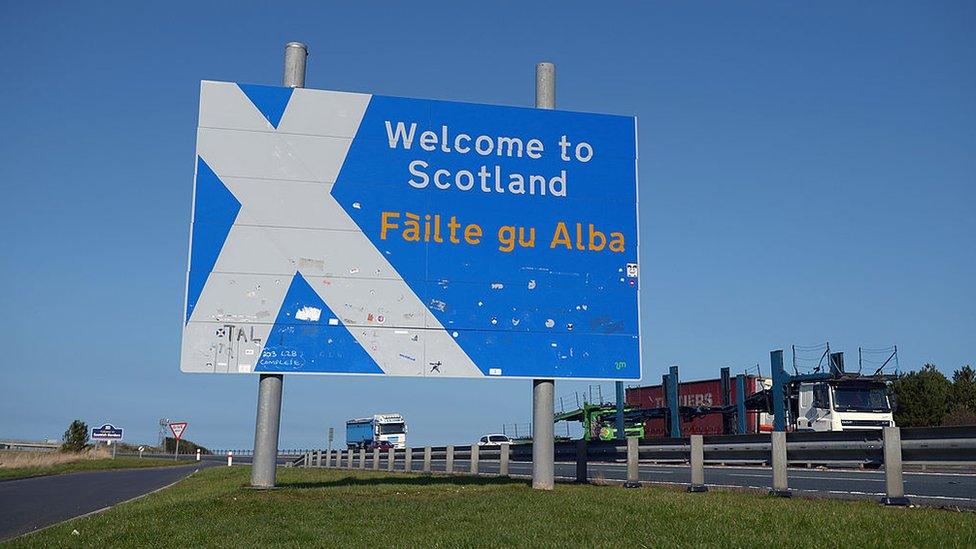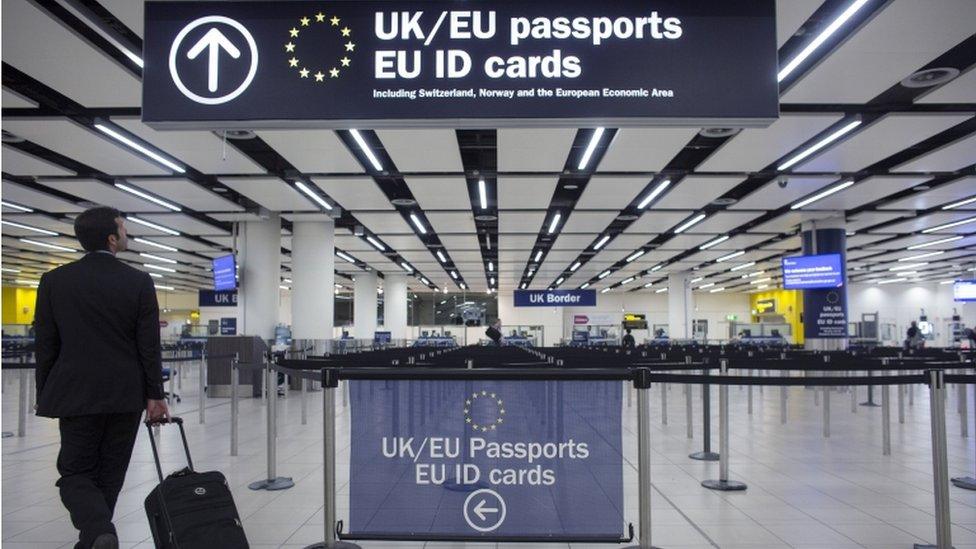Scotland Brexit: 50,000 applications for EU Settlement Scheme
- Published

About a quarter of the estimated 220,000 EU citizens living in Scotland have so far applied to remain in the UK after Brexit.
The Home Office said it received 51,600 applications from Scotland under the EU Settlement Scheme, external by the end of July.
The scheme aims to help EU citizens and their families to live and work in the UK after freedom of movement ends.
Applicants must prove their identity, show that they live in the UK and declare any criminal convictions.
The Scottish government has called the system "demeaning and unacceptable" and has urged the UK government to simplify it.
The scheme has been open to EU, EEA and Swiss citizens since March of this year, with applications currently having to be made by 31 December 2020 if the UK leaves without a deal, and 30 June 2021 if it leaves with a deal.
Anyone granted settled status will be entitled to the same work, healthcare, housing and education rights after Britain leaves the EU as they do now.
Irish citizens do not have to apply as their rights have already been guaranteed under an agreement between the UK and Irish governments.
There are thought to be about 223,000 EU citizens living in Scotland, including about 13,000 who work in the NHS, and more than three million across the UK as a whole - with a million people having been granted settled or pre-settled status so far.
Home Office minister Brandon Lewis said EU citizens made a "huge" contribution to Scotland, and that his message to them was "we want you to stay".
He added: "Through the EU Settlement Scheme, it is free and straightforward to make an application and I am pleased that more than 50,000 already have done so.
"We're looking to grant status under the scheme, not to refuse it, and EU citizens have until at least 31 December 2020 to apply.
'Welcome here'
The Scottish government launched a "Stay in Scotland", external campaign earlier this year to encourage EU citizens to remain in the country after Brexit.
Its migration minister, Ben Macpherson, said: "It's unacceptable that EU citizens in our communities are having to engage in this demeaning process and have been forced to live with extreme levels of uncertainty about how Brexit will affect their lives, their careers and their families.
"The Scottish government has been consistently clear that in place of the EU Settlement Scheme, the UK government should instead adopt a declaratory system, which would remove the need for people to make applications to continue living here."
Citizens Advice Scotland can provide advice to EU citizens and their families, via a freephone advice line, external,

Earlier this week, the government announced that EU freedom of movement rules will end immediately if there is a no-deal Brexit on 31 October.
It had previously considered phasing out the rules if the UK leaves without an agreement, but those plans have now been dropped.
However, the government insisted that the December 2020 deadline for settled status applications would remain, with a "new, fairer immigration system" introduced which would "prioritise skills and what people can contribute to the UK, rather than where they come from".
Prime Minister Boris Johnson also pledged that the UK would not become "hostile to immigration".
The announcement was criticised by campaigners and opposition parties, who said it would cause further confusion for EU nationals and problems for businesses and other employers.
An end to freedom of movement would not affect those EU citizens coming for holidays and short trips, but would impact those who wish to work or study in the UK and who do not have settled status.
Under the withdrawal agreement negotiated with the EU by former Prime Minister Mrs May, freedom of movement would have stayed for a two-year transition period.
However, MPs repeatedly voted down Mrs May's deal and unless an agreement can be reached the UK will leave without a deal on 31 October.